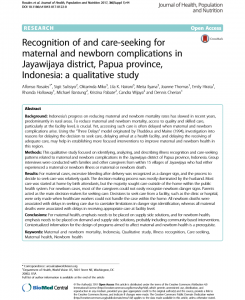
Indonesia’s progress on reducing maternal and newborn mortality rates has slowed in recent years, predominantly in rural areas. To reduce maternal and newborn mortality, access to quality and skilled care, particularly at the facility level, is crucial. Yet, accessing such care is often delayed when maternal and newborn complications arise. Using the “Three Delays” model originated by Thaddeus and Maine (1994), investigation into reasons for delaying the decision to seek care, delaying arrival at a health facility, and delaying the receiving of adequate care, may help in establishing more focused interventions to improve maternal and newborn health in this region.
This qualitative study focused on identifying, analyzing, and describing illness recognition and care-seeking patterns related to maternal and newborn complications in the Jayawijaya district of Papua province, Indonesia. Group interviews were conducted with families and other caregivers from within 15 villages of Jayawijaya who had either experienced a maternal or newborn illness or maternal or newborn death.
For maternal health, emphasis needs to be placed on supply side solutions, and for newborn health, emphasis needs to be placed on demand and supply side solutions, probably including community-based interventions. Contextualized information for the design of programs aimed to affect maternal and newborn health is a prerequisite.